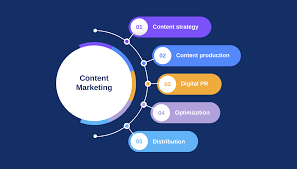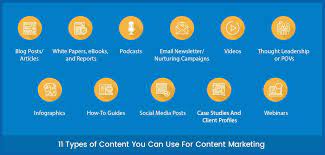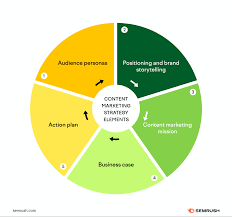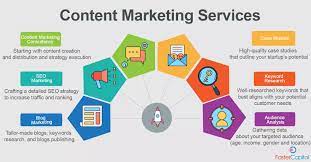Empowering Your Brand’s Success with a Leading Digital Content Marketing Agency
Title: The Power of a Digital Content Marketing Agency in Today’s Business Landscape
Introduction:
In today’s fast-paced digital world, businesses are constantly seeking innovative ways to connect with their target audience. One such powerful tool is digital content marketing. However, creating and implementing an effective content marketing strategy requires expertise, time, and resources. This is where a digital content marketing agency steps in as a valuable partner to drive success. In this article, we will explore the key benefits and advantages of partnering with a digital content marketing agency.
Expertise and Specialization:
Digital content marketing agencies are equipped with a team of professionals who specialize in various aspects of content creation, distribution, and optimization. They possess the knowledge and experience to craft compelling content that resonates with your target audience across different platforms. From SEO optimization to social media management, they have the expertise to ensure your brand stands out amidst the noise.
Strategic Approach:
A digital content marketing agency takes a strategic approach towards crafting and executing your content marketing strategy. They conduct thorough research on your industry, competitors, and target audience to identify key opportunities for growth. By understanding your business goals and objectives, they develop tailored strategies that align with your brand identity and resonate with your audience.
Time and Resource Efficiency:
Creating high-quality content consistently can be time-consuming for businesses that already have numerous responsibilities on their plate. By outsourcing this task to a digital content marketing agency, you can save valuable time and allocate resources more efficiently. This allows you to focus on core business activities while ensuring that your content remains fresh, relevant, and engaging.
Access to Cutting-Edge Tools:
Digital content marketing agencies have access to advanced tools and software that enable them to analyze data effectively, track performance metrics, optimize campaigns, and measure ROI accurately. Leveraging these tools ensures that your content strategy remains data-driven and adaptable in an ever-evolving digital landscape.
Scalability and Flexibility:
As your business grows, so do your content marketing needs. A digital content marketing agency provides scalability and flexibility to accommodate your changing requirements. Whether you need to ramp up content production during peak seasons or adjust your strategy based on market trends, they can adapt quickly to meet your evolving needs.
Measurable Results:
One of the key advantages of working with a digital content marketing agency is the ability to measure and track the success of your campaigns accurately. They provide detailed analytics reports that highlight key performance indicators, such as website traffic, engagement metrics, conversion rates, and more. This data-driven approach allows you to make informed decisions and refine your strategy for optimal results.
Conclusion:
In today’s digital landscape, a strong online presence is essential for business success. Partnering with a digital content marketing agency offers numerous advantages, including expertise, strategic approach, time efficiency, access to cutting-edge tools, scalability, and measurable results. By entrusting professionals with your content marketing efforts, you can focus on other critical aspects of your business while ensuring that your brand remains visible and relevant in the digital realm. Embrace the power of a digital content marketing agency today and unlock new opportunities for growth and success!
6 Advantages of Engaging a Digital Content Marketing Agency in the UK
- Cost effectiveness – Digital content marketing agencies are typically more cost effective than traditional marketing methods, providing a greater return on investment.
- Reach – With the right digital content marketing strategy, you can reach a much wider audience than with traditional methods.
- Expertise – Digital content marketing agencies have the expertise to create campaigns that will engage your target audience and help you achieve your goals quickly and efficiently.
- Efficiency – Digital content marketing is highly efficient as it allows for quick turnaround times and results can be tracked in real-time, allowing for adjustments to be made quickly if needed.
- Flexibility – A digital content marketing agency can provide you with a variety of options to choose from when creating campaigns, giving you greater flexibility in how your message is communicated to potential customers or clients.
- Data-driven insights – By utilising data-driven insights, digital content marketing agencies are able to identify areas of improvement within campaigns and make adjustments accordingly in order to maximise their effectiveness over time
Challenges of Outsourcing to a Digital Content Marketing Agency: Cost, Quality, Lack of Control, and Time
- Cost – Digital content marketing agencies can be expensive, and it may not always be cost-effective to outsource this type of work.
- Quality – The quality of the digital content produced by an agency may not meet the standards expected by a business or their customers.
- Lack of Control – When outsourcing to a digital content marketing agency, there is less control over how the project is executed and delivered, leaving businesses at risk of not getting what they paid for.
- Time – Working with an outside agency can often take longer than expected due to communication delays and other factors that are out of the business’ control.
Cost effectiveness – Digital content marketing agencies are typically more cost effective than traditional marketing methods, providing a greater return on investment.
Cost effectiveness – The Greater Return on Investment with Digital Content Marketing Agencies
In today’s competitive business landscape, companies are constantly seeking ways to maximize their marketing budgets while achieving significant results. This is where digital content marketing agencies shine, offering a cost-effective alternative to traditional marketing methods.
Digital content marketing agencies operate in the digital sphere, leveraging various online platforms and strategies to promote businesses and engage with their target audience. Unlike traditional marketing approaches, such as print advertising or TV commercials, digital content marketing agencies offer a greater return on investment (ROI) for several reasons.
Firstly, digital content marketing allows for precise targeting. By utilizing data analytics and audience segmentation techniques, these agencies can identify and reach specific demographics that are most likely to be interested in your products or services. This targeted approach ensures that your marketing efforts are not wasted on reaching an irrelevant audience but instead focus on those who are more likely to convert into customers.
Secondly, digital content marketing agencies have the ability to track and measure campaign performance accurately. With advanced analytics tools at their disposal, they can monitor key performance indicators such as website traffic, engagement rates, conversion rates, and more. This data-driven approach enables them to optimize campaigns in real-time by identifying what works and what doesn’t. By continuously refining strategies based on measurable results, digital content marketing agencies ensure that every penny of your budget is spent effectively.
Furthermore, digital content marketing eliminates the need for costly physical materials or media space traditionally associated with print advertisements or TV commercials. With online platforms such as social media channels or email newsletters, businesses can reach a wider audience at a fraction of the cost. Additionally, digital campaigns can be easily adjusted or scaled up/down based on budget constraints or market conditions.
Lastly, the cost-effectiveness of digital content marketing lies in its long-term impact. Unlike traditional methods that have limited exposure periods (such as a newspaper ad running for a day), digital content has the potential to be evergreen and accessible for an extended period. Well-crafted content, such as blog posts or video tutorials, can continue to attract and engage potential customers long after they are initially published.
In conclusion, partnering with a digital content marketing agency offers businesses a cost-effective approach to promoting their brand and achieving a greater ROI. Through precise targeting, accurate measurement of campaign performance, elimination of costly physical materials, and the potential for long-term impact, digital content marketing agencies provide a compelling alternative to traditional marketing methods. By investing in digital strategies, businesses can stretch their marketing budgets further and achieve significant results in the dynamic online landscape.
Reach – With the right digital content marketing strategy, you can reach a much wider audience than with traditional methods.
Title: Expanding Your Reach: The Power of Digital Content Marketing Agencies
In today’s digital age, businesses are constantly seeking ways to expand their reach and connect with a wider audience. Traditional marketing methods have their limitations, often reaching a limited number of people within a specific demographic. However, with the right digital content marketing strategy, businesses can harness the power of technology to reach a much broader and diverse audience.
Digital content marketing agencies play a crucial role in helping businesses tap into this vast potential for increased reach. Here’s how they accomplish this feat:
Targeted Approach:
Digital content marketing agencies have the expertise to identify and understand your target audience. Through market research, data analysis, and consumer insights, they create highly targeted content that resonates with your intended audience. By focusing on the right platforms and channels where your target audience is most active, they maximize your chances of reaching them effectively.
Search Engine Optimization (SEO):
A key aspect of digital content marketing is optimizing your online presence for search engines. Digital content marketing agencies employ SEO techniques to ensure that your website ranks higher in search engine results pages (SERPs). By incorporating relevant keywords, creating valuable content, and optimizing meta tags and descriptions, they enhance your visibility and attract organic traffic from search engines.
Social Media Engagement:
Social media platforms have become powerful tools for reaching a wider audience. Digital content marketing agencies understand the nuances of each platform and develop strategies to engage users effectively. They leverage social media channels to promote your brand, share valuable content, interact with followers, and ultimately expand your reach beyond traditional boundaries.
Content Distribution Networks:
Digital content marketing agencies have access to extensive networks for distributing your content across various channels. Whether it’s guest posting on influential websites or leveraging industry-specific platforms, they ensure that your message reaches relevant audiences who may not have been exposed to your brand otherwise.
Viral Potential:
One of the unique advantages of digital content marketing is its potential to go viral. Engaging, shareable content has the ability to reach millions of people within a short span of time. Digital content marketing agencies understand the ingredients for creating viral-worthy content and employ strategies to increase its chances of gaining traction and reaching an extensive audience.
By harnessing the expertise and resources of a digital content marketing agency, businesses can break free from the limitations of traditional methods and expand their reach exponentially. With targeted approaches, SEO optimization, social media engagement, content distribution networks, and the potential for viral success, businesses can connect with a much wider audience than ever before.
Embrace the power of digital content marketing agencies today and unlock new opportunities for growth and success. Expand your reach beyond boundaries and establish a strong online presence that resonates with your target audience on a global scale.
Expertise – Digital content marketing agencies have the expertise to create campaigns that will engage your target audience and help you achieve your goals quickly and efficiently.
In today’s competitive digital landscape, standing out and capturing the attention of your target audience can be a daunting task. This is where the expertise of a digital content marketing agency becomes invaluable. These agencies have a team of professionals who possess the knowledge, skills, and experience to create campaigns that not only engage your target audience but also help you achieve your goals quickly and efficiently.
Digital content marketing agencies understand the nuances of different platforms and channels. They are well-versed in crafting content that resonates with your specific audience, whether it’s through blog posts, social media updates, videos, or interactive experiences. By leveraging their expertise, they can develop compelling campaigns that capture attention and drive meaningful engagement.
Moreover, these agencies stay up-to-date with the latest trends and best practices in the ever-evolving digital landscape. They are aware of emerging technologies, algorithm changes, and consumer preferences. This allows them to adapt their strategies accordingly and ensure that your content remains relevant and impactful.
The expertise of a digital content marketing agency extends beyond just creating captivating content. They also possess a deep understanding of data analysis and performance metrics. By monitoring key indicators such as website traffic, click-through rates, conversions, and engagement levels, they can assess the effectiveness of their campaigns in real-time. This data-driven approach enables them to make informed decisions and optimize strategies for maximum impact.
Furthermore, digital content marketing agencies have experience working with diverse clients across various industries. This exposure allows them to bring fresh perspectives and innovative ideas to your campaigns. They understand what works (and what doesn’t) in different markets and can tailor their approach accordingly.
By partnering with a digital content marketing agency for their expertise, businesses can save valuable time and resources. Instead of spending hours researching trends or experimenting with different strategies on their own, they can rely on the agency’s knowledge to create effective campaigns from day one.
In conclusion, the expertise offered by a digital content marketing agency is a significant advantage for businesses looking to make a mark in the digital world. Their understanding of platforms, data analysis, industry trends, and consumer preferences allows them to create campaigns that engage your target audience and help you achieve your goals efficiently. By leveraging their expertise, businesses can save time, resources, and ultimately drive meaningful results in the ever-competitive digital landscape.
Efficiency – Digital content marketing is highly efficient as it allows for quick turnaround times and results can be tracked in real-time, allowing for adjustments to be made quickly if needed.
Efficiency – The Key Advantage of a Digital Content Marketing Agency
In today’s fast-paced business environment, efficiency is paramount. This is where partnering with a digital content marketing agency can truly make a difference. One of the key advantages they offer is the ability to deliver efficient results with quick turnaround times.
Digital content marketing allows businesses to create and distribute content across various online platforms, reaching their target audience in real-time. Unlike traditional marketing methods, digital content marketing enables businesses to track the performance of their campaigns instantly. This means that adjustments can be made swiftly if needed, ensuring that your content remains relevant and effective.
With a digital content marketing agency, you have access to professionals who specialize in crafting compelling and engaging content tailored to your audience. They are well-versed in using data analytics tools that provide real-time insights into the performance of your campaigns. By monitoring metrics such as website traffic, click-through rates, engagement levels, and conversions, they can quickly identify what works and what needs improvement.
The ability to track results in real-time offers businesses unparalleled flexibility. If certain aspects of a campaign are not performing as expected, adjustments can be made promptly to optimize its impact. Whether it’s tweaking the messaging, targeting specific demographics or adjusting the distribution channels, a digital content marketing agency can adapt swiftly to maximize your return on investment.
Furthermore, the efficiency of digital content marketing extends beyond just tracking results. It also encompasses quick turnaround times for creating and distributing content. With their expertise and streamlined processes, digital content marketing agencies are equipped to deliver high-quality content within tight deadlines.
By leveraging their knowledge of industry trends and consumer behavior, these agencies can develop effective strategies that resonate with your target audience efficiently. They understand how to craft compelling narratives and utilize various media formats such as blog posts, videos, infographics or social media posts for maximum impact.
In conclusion, partnering with a digital content marketing agency offers businesses unrivaled efficiency in their marketing efforts. The ability to track results in real-time allows for quick adjustments, ensuring that your content remains relevant and effective. With their expertise and streamlined processes, these agencies can deliver high-quality content within tight deadlines. Embrace the efficiency of digital content marketing and stay ahead in the ever-evolving digital landscape.
Flexibility – A digital content marketing agency can provide you with a variety of options to choose from when creating campaigns, giving you greater flexibility in how your message is communicated to potential customers or clients.
Flexibility – Enhancing Your Message with a Digital Content Marketing Agency
In the ever-evolving digital landscape, businesses need to adapt quickly and effectively to reach their target audience. This is where the flexibility offered by a digital content marketing agency becomes invaluable. By partnering with such an agency, businesses gain access to a wide range of options for creating campaigns, allowing them greater flexibility in how their message is communicated to potential customers or clients.
A digital content marketing agency understands that every business is unique, with its own goals, values, and target audience. They work closely with clients to understand their specific needs and objectives. With this knowledge in hand, the agency can offer a variety of options when it comes to crafting and executing campaigns.
One of the key advantages of this flexibility is the ability to tailor the message for different platforms and mediums. A digital content marketing agency can help businesses leverage various channels such as social media, blogs, email marketing, video content, and more. By adapting the message for each platform, businesses can effectively engage with their audience in a way that resonates most strongly.
Furthermore, this flexibility extends beyond just choosing the right platforms. A digital content marketing agency can also provide options in terms of content formats. Whether it’s informative blog posts, engaging videos or podcasts, visually appealing infographics or interactive quizzes – there are endless possibilities to capture attention and deliver your message effectively.
By having a variety of options at their disposal, businesses can experiment with different approaches and strategies. This allows them to test what works best for their target audience and refine their campaigns accordingly. The ability to adapt quickly based on data-driven insights ensures that businesses stay relevant and ahead of the competition.
Additionally, working with a digital content marketing agency provides businesses with access to professionals who are well-versed in industry trends and best practices. These experts stay up-to-date with emerging technologies and evolving consumer preferences. They can guide businesses in selecting the most effective options for their campaigns, ensuring that their message is communicated in a way that resonates with their target audience.
In conclusion, the flexibility offered by a digital content marketing agency is a significant advantage for businesses. It allows them to choose from a variety of options when creating campaigns, enabling them to adapt their message to different platforms and mediums. This flexibility empowers businesses to experiment, refine strategies based on data-driven insights, and ultimately deliver their message in a way that effectively engages potential customers or clients. Embrace the flexibility of a digital content marketing agency and unlock new opportunities for success in the dynamic digital landscape.
Data-driven insights – By utilising data-driven insights, digital content marketing agencies are able to identify areas of improvement within campaigns and make adjustments accordingly in order to maximise their effectiveness over time
Title: Harnessing the Power of Data-Driven Insights in Digital Content Marketing
In the ever-evolving world of digital content marketing, staying ahead of the curve is vital for businesses looking to make a lasting impact. One significant advantage offered by digital content marketing agencies is their ability to leverage data-driven insights. By analysing and utilising data, these agencies can identify areas of improvement within campaigns and make necessary adjustments to maximize their effectiveness over time.
Data-driven insights provide a wealth of valuable information that can shape and refine content strategies. By examining metrics such as website traffic, engagement rates, conversion rates, and customer behaviour patterns, digital content marketing agencies gain a comprehensive understanding of how audiences interact with content. This knowledge allows them to identify successful tactics and areas that require improvement.
One key benefit of data-driven insights is the ability to measure campaign performance accurately. By tracking relevant metrics, agencies can determine which elements of a campaign are driving desired results and which may need refinement. This level of analysis enables them to make informed decisions about allocating resources and adjusting strategies accordingly.
Moreover, data-driven insights help agencies identify trends and patterns that may go unnoticed otherwise. By spotting these patterns early on, they can proactively adjust content strategies to align with emerging market preferences or shifts in audience behaviour. This agility ensures that businesses stay relevant in an ever-changing digital landscape.
Digital content marketing agencies also use data-driven insights to conduct A/B testing or split testing experiments. By comparing different variations of content elements such as headlines, visuals, or calls-to-action, they can determine which version performs better based on real audience responses. This iterative approach allows for continuous improvement and optimization over time.
Furthermore, data-driven insights enable agencies to personalize content experiences for different segments of their target audience. By analyzing demographic information, browsing habits, or purchase history, they can tailor content specifically to individual preferences or interests. This personalized approach enhances engagement levels and strengthens brand-consumer relationships.
In summary, the power of data-driven insights in digital content marketing cannot be underestimated. By harnessing the wealth of information available, digital content marketing agencies can identify areas of improvement within campaigns and make adjustments accordingly. This data-driven approach ensures that strategies remain adaptable, relevant, and effective over time. By partnering with a digital content marketing agency that utilizes data-driven insights, businesses can gain a competitive edge and achieve their marketing objectives with precision and efficiency.
Cost – Digital content marketing agencies can be expensive, and it may not always be cost-effective to outsource this type of work.
Title: The Cost Conundrum: Evaluating the Expense of Digital Content Marketing Agencies
Introduction:
In the ever-evolving digital landscape, businesses are increasingly turning to digital content marketing agencies to harness the power of compelling content. While these agencies offer numerous benefits, it is essential to consider the potential drawbacks as well. One significant concern that arises when partnering with a digital content marketing agency is the cost involved. In this article, we will explore the con of cost and discuss how businesses can evaluate whether outsourcing their content marketing efforts is truly cost-effective.
Expense vs. Return on Investment:
Undoubtedly, hiring a digital content marketing agency can be expensive. Businesses must carefully weigh the potential return on investment (ROI) against the cost incurred. It is crucial to assess whether the expertise, resources, and strategic approach provided by an agency justify the financial investment in terms of increased brand visibility, lead generation, customer engagement, and ultimately, revenue growth.
Comparing In-House vs. Outsourcing Costs:
To determine whether outsourcing content marketing is cost-effective, businesses should compare the expenses associated with an in-house team versus those of a digital content marketing agency. Considerations include salaries and benefits for full-time employees, training costs, software licenses and subscriptions, equipment expenses, and ongoing professional development. By conducting a thorough cost analysis, businesses can make an informed decision about which option aligns better with their budgetary constraints.
Customized Service Packages:
Digital content marketing agencies often provide a range of service packages tailored to different business needs and budgets. It is crucial for businesses to thoroughly review these packages and understand what services are included at each price point. By selecting a package that aligns with their specific goals and budgetary limitations, businesses can strike a balance between quality service delivery and cost-effectiveness.
Transparent Pricing Structure:
When considering a digital content marketing agency, it is essential to seek transparency in their pricing structure. A reputable agency will provide a clear breakdown of costs, ensuring that businesses understand what they are paying for. This transparency allows for better cost evaluation and facilitates informed decision-making.
Alternative Options:
While outsourcing to a digital content marketing agency may be the preferred choice for some businesses, others may find alternative options more cost-effective. For instance, hiring freelance content creators or utilizing existing in-house resources with proper training and guidance can be viable alternatives that reduce expenditure while maintaining quality.
Conclusion:
The cost of partnering with a digital content marketing agency is undoubtedly a con that businesses must consider. However, by carefully evaluating the potential return on investment, comparing in-house costs versus outsourcing expenses, exploring customized service packages, seeking transparency in pricing structures, and considering alternative options, businesses can make an informed decision about whether outsourcing their content marketing efforts aligns with their budgetary constraints and long-term growth objectives. It is crucial to strike a balance between cost-effectiveness and the expertise and resources provided by digital content marketing agencies to achieve optimal results in today’s competitive digital landscape.
Quality – The quality of the digital content produced by an agency may not meet the standards expected by a business or their customers.
Title: The Conundrum of Quality in Digital Content Marketing Agencies
Introduction:
In the fast-paced world of digital content marketing, businesses often turn to agencies for assistance in creating compelling content that resonates with their target audience. While partnering with a digital content marketing agency offers numerous benefits, it’s important to acknowledge that there can be potential downsides as well. One such concern revolves around the quality of the digital content produced by these agencies, which may not always meet the high standards expected by businesses or their customers. In this article, we will explore this conundrum and offer insights on how to mitigate the risks.
The Challenge of Maintaining Consistent Quality:
Digital content marketing agencies often handle multiple clients simultaneously, each with their unique requirements and deadlines. This can sometimes result in a compromise on quality as agencies strive to meet tight timelines and manage a heavy workload. When quality is compromised, it can negatively impact a business’s reputation and fail to engage its target audience effectively.
Varied Interpretations of Brand Voice:
Every business has its unique brand voice and identity that they want to convey through their content. However, ensuring that an agency fully understands and accurately represents this brand voice can be challenging. Misinterpretation or miscommunication between the business and agency may lead to inconsistencies in tone, messaging, or style, ultimately affecting the overall quality of the digital content produced.
Dependency on Outsourced Talent:
Digital content marketing agencies often rely on freelancers or outsourced talent to handle various aspects of content creation. While this approach allows for flexibility and access to specialized skills, it also introduces an element of uncertainty regarding quality control. The agency may not have direct oversight over every individual involved in creating the content, leading to potential variations in quality across different projects.
The Importance of Clear Communication:
To mitigate these concerns surrounding quality, businesses must establish clear lines of communication with the digital content marketing agency. This includes providing detailed briefs, brand guidelines, and regular feedback to ensure that the agency fully understands the expectations and requirements. Open and transparent communication channels help foster a collaborative relationship that prioritizes quality output.
Quality Assurance Measures:
Businesses can also implement quality assurance measures by requesting samples of previous work from the agency, conducting thorough research on their reputation and client testimonials, and seeking references from other businesses who have worked with them. These steps can provide insights into the agency’s track record in delivering high-quality content.
Conclusion:
While there are undeniable benefits to partnering with a digital content marketing agency, it’s crucial to acknowledge the potential con of compromised quality. By being proactive in establishing clear communication channels, setting expectations, and implementing quality assurance measures, businesses can mitigate these risks effectively. A strong partnership between a business and its chosen agency is built on trust, collaboration, and a shared commitment to delivering content that meets or exceeds expectations. With careful consideration and due diligence, businesses can navigate this conundrum of quality to ensure that their digital content resonates with their audience and drives meaningful results.
Lack of Control – When outsourcing to a digital content marketing agency, there is less control over how the project is executed and delivered, leaving businesses at risk of not getting what they paid for.
Title: The Conundrum of Lack of Control in Outsourcing to a Digital Content Marketing Agency
Introduction:
In the fast-paced world of digital marketing, businesses often turn to digital content marketing agencies for their expertise and resources. While outsourcing to these agencies offers numerous benefits, it is important to acknowledge the potential con that comes with it – the lack of control over project execution and delivery. In this article, we will explore this aspect and shed light on how businesses can mitigate the associated risks.
The Challenge of Outsourcing:
When businesses outsource their content marketing efforts to a digital agency, they relinquish a certain degree of control over the project’s execution. This can be concerning for some companies who want to maintain a hands-on approach or have specific requirements that demand close oversight.
Potential Risks:
The lack of control may result in misalignment between the business’s expectations and what is delivered by the agency. There is a risk of not getting exactly what was paid for, whether it’s in terms of content quality, tone, style, or even meeting deadlines. This can lead to frustration and dissatisfaction on the part of the business.
Mitigating Risks:
While lack of control may be a valid concern, there are steps businesses can take to mitigate associated risks when outsourcing to a digital content marketing agency:
- Clear Communication: Establish open and transparent communication channels with the agency from the start. Clearly articulate your goals, expectations, and any specific requirements you have regarding content creation and delivery.
- Detailed Contracts: Ensure that you have a well-defined contract that outlines deliverables, timelines, quality standards, revision processes, and any other pertinent details. A comprehensive agreement helps set clear expectations for both parties involved.
- Regular Updates and Reporting: Request regular updates from the agency regarding project progress and milestones achieved. This allows you to stay informed and address any concerns or deviations from the agreed-upon plan promptly.
- Collaboration and Feedback: Foster a collaborative relationship with the agency. Provide constructive feedback throughout the project to guide them towards meeting your expectations. Regular check-ins and feedback loops can help align their work with your vision.
- Quality Assurance: Establish a quality assurance process to ensure that the content delivered meets your standards. This may involve reviewing samples, setting up approval stages, or conducting periodic audits of the agency’s work.
Conclusion:
While outsourcing to a digital content marketing agency offers numerous benefits, it is crucial for businesses to be aware of the potential challenge of lack of control over project execution and delivery. By implementing clear communication, detailed contracts, regular updates, collaboration, and quality assurance measures, businesses can mitigate these risks effectively. Remember, successful partnerships are built on trust, transparency, and effective communication between businesses and agencies. With careful planning and proactive management, businesses can still harness the advantages of outsourcing while minimizing any potential pitfalls associated with lack of control.
Time – Working with an outside agency can often take longer than expected due to communication delays and other factors that are out of the business’ control.
Title: The Time Conundrum: Navigating Delays when Working with a Digital Content Marketing Agency
Introduction:
In the fast-paced world of digital content marketing, time is of the essence. While partnering with a digital content marketing agency offers numerous benefits, it’s important to acknowledge that there can be potential drawbacks. One such con is the possibility of encountering delays that can impact your timeline and disrupt your business operations. In this article, we will explore the time-related challenges that businesses may face when working with an external digital content marketing agency.
Communication Challenges:
Effective communication is crucial for any successful collaboration. However, working with an outside agency can sometimes result in communication delays due to various factors. Misunderstandings, time zone differences, and a lack of clarity in project expectations can all contribute to slower response times and hinder progress.
Dependency on External Factors:
When relying on a digital content marketing agency, businesses are often at the mercy of external factors that are beyond their control. These factors could include unforeseen circumstances such as technical issues, staff changes within the agency, or even unexpected delays caused by third-party vendors involved in the project. Such dependencies can lead to project timelines being extended beyond initial expectations.
Complex Approval Processes:
Content creation and marketing involve multiple stakeholders within both the business and the agency. Obtaining approvals from various individuals or departments can sometimes become a lengthy process, especially if there are differing opinions or conflicting priorities among those involved. This complexity can cause delays in delivering finalised content or executing campaigns within desired timeframes.
Adapting to Changing Requirements:
In today’s dynamic business environment, requirements often evolve over time. As market trends shift or new opportunities arise, businesses may need to modify their content strategies accordingly. However, implementing these changes through an external agency might involve additional coordination and negotiation, which can slow down the process and impact the overall timeline.
Mitigating Time Challenges:
While delays can be a potential con of working with a digital content marketing agency, there are steps that businesses can take to mitigate these challenges. Clear and open communication channels, establishing realistic timelines from the outset, and maintaining regular check-ins with the agency can help minimize misunderstandings and keep projects on track. Additionally, setting clear expectations and providing prompt feedback during the approval process can help expedite decision-making.
Conclusion:
While it is true that working with an external digital content marketing agency carries the risk of encountering time-related challenges, these hurdles can be overcome with effective communication, proactive planning, and a collaborative approach. By acknowledging potential delays and taking steps to mitigate them, businesses can still reap the benefits of partnering with an agency while ensuring their projects stay on course. Ultimately, finding the right balance between speed and quality is crucial when navigating the time conundrum in this ever-evolving digital landscape.









